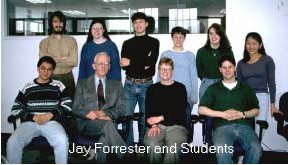Learning Stories
by
Mario deSantis
mariodesantis@hotmail.com
“I am a Canadian, free to speak without fear, free to worship in my own way, free to stand for what I think right, free to oppose what I believe wrong, and free to choose those who shall govern my country.” - -The Rt. Hon. John Diefenbaker, Canadian Bill of Rights, 1960
“The whole judicial system is at issue, it's worth more than one person.”--Serge Kujawa, Saskatchewan Crown Prosecutor, 1991
“The system is not more worth than one person's rights.”--Mario deSantis, 2002
Ensign Stories © Mario deSantis and Ensign
|
Systems Dynamics In Education: An Introduction
Sunday February 14, 1999 |
| Recently, there has been a widespread concern expressed about the quality of education. Parents, .teachers, business people and university professors have all voiced their dismay to the present declining educational standards(1) and yet no educational policy to address this problem has been . formulated by the government. The government lack of leadership in tackling the need to reform our educational system can be synthesized with their legislated permission to use corporal punishment against children(2). I have written few articles addressing the need to change our educational system and I have introduced the philosophical background of the biological origin of cognition(3) and the pedagogical constructivism(4) (5) approach to educate our students. Last week, I promised myself to study a simulation program VENSIM(6) and in doing so I discovered another challenging and pedagogical approach to education: Systems Dynamics(7). There is nothing contradictory about my articles, rather it is amazing to realize their underlying common themes to prepare our students to become the knowledge workers(8) of the future, to have a shared understanding of realities, to construct our own knowledge, use new technologies to enhance our learning capacities, in summary to learn by doing rather than by listening. Everyday as we read or watch the news we come across many
stories, stories of homelessness, prostitution, homicides, political
corruption, business incompetence. Our world is convoluted,
difficult to understand and our actions, all interdependent to one
another, are the causes of such grim realities. We have a complex
world and our political leaders and bureaucrats choose simple
actions to find short term solutions to problems without realizing
that the long term effects of these actions create new problems or
make these same problems more painful in the future. We have learned
to see the world as a series of unrelated snapshots, and this is the
way we have conceptualized knowledge in our schools, an accumulation
of snapshots to be transferred in the minds of our children. The
truth is that we all build our own knowledge, and if we want to have
responsible citizens, our students must learn how to think,
understand relationships, increase their capacity to understand the
consequences of their actions.
Endnotes 1. . Thoughts on Education, Knowledge, Learning and the Internet, by Mario deSantis, January 24, 1999. Published in the North Central Internet News http://ftlcomm.com/ensign 2. Article: Report takes swipe at province: Serby prefers school divisions deal with use of force, by Jason Warick, The StarPhoenix, November 28, 1998, Saskatoon, Saskatchewan 3. Need of Transformational Changes in Saskatchewan: The biological origin of cognition and implications for Education, by Mario deSantis, September 27, 1998. Published in the North Central Internet News http://ftlcomm.com/ensign 4. A Personal Experience: Knowledge Is Not Transferred, It is Constructed, by Mario deSantis, February 2, 1999. Published in the North Central Internet News http://ftlcomm.com/ensign 5. A New Approach In Learning Mathematics, by Mario deSantis, January 31, 1999. Published in the North Central Internet News http://ftlcomm.com/ensign 6. Ventana Systems, Inc is the publisher of Vensim PLE. This computer modelling software is available free of charge for educational institutions wanting to experiment with the pedagogical approach of Systems Dynamics. Email: vensim@vensim.com http://www.vensim.com 7. System Dynamics in Education, MIT related web site http://sysdyn.mit.edu/ 8. The management expert and futurist Peter F. Drucker coined the term "Knowledge Worker" some twenty five years ago. Refer to the site Peter F. Drucker Foundation http://www.pfdf.org/ 9. Jay W. Forrester is Germeshausen Professor Emeritus and Senior Lecturer at the Sloan School of Management, Massachusetts Institute of Technology-MIT. http://sysdyn.mit.edu/people/jay-forrester.html
|
 In
short, we require a system approach to education where all the
fragmented subjects of the curriculum can be appreciated as
interacting to one another and where their common underlying
behaviour can be understood. Jay Forrester, Professor Emeritus at
MIT(9), understood the capabilities of computers in addressing the
shortcomings of our educational system and founded a new approach to
education: Systems Dynamics, a set of techniques based on computer
modelling.
In
short, we require a system approach to education where all the
fragmented subjects of the curriculum can be appreciated as
interacting to one another and where their common underlying
behaviour can be understood. Jay Forrester, Professor Emeritus at
MIT(9), understood the capabilities of computers in addressing the
shortcomings of our educational system and founded a new approach to
education: Systems Dynamics, a set of techniques based on computer
modelling.